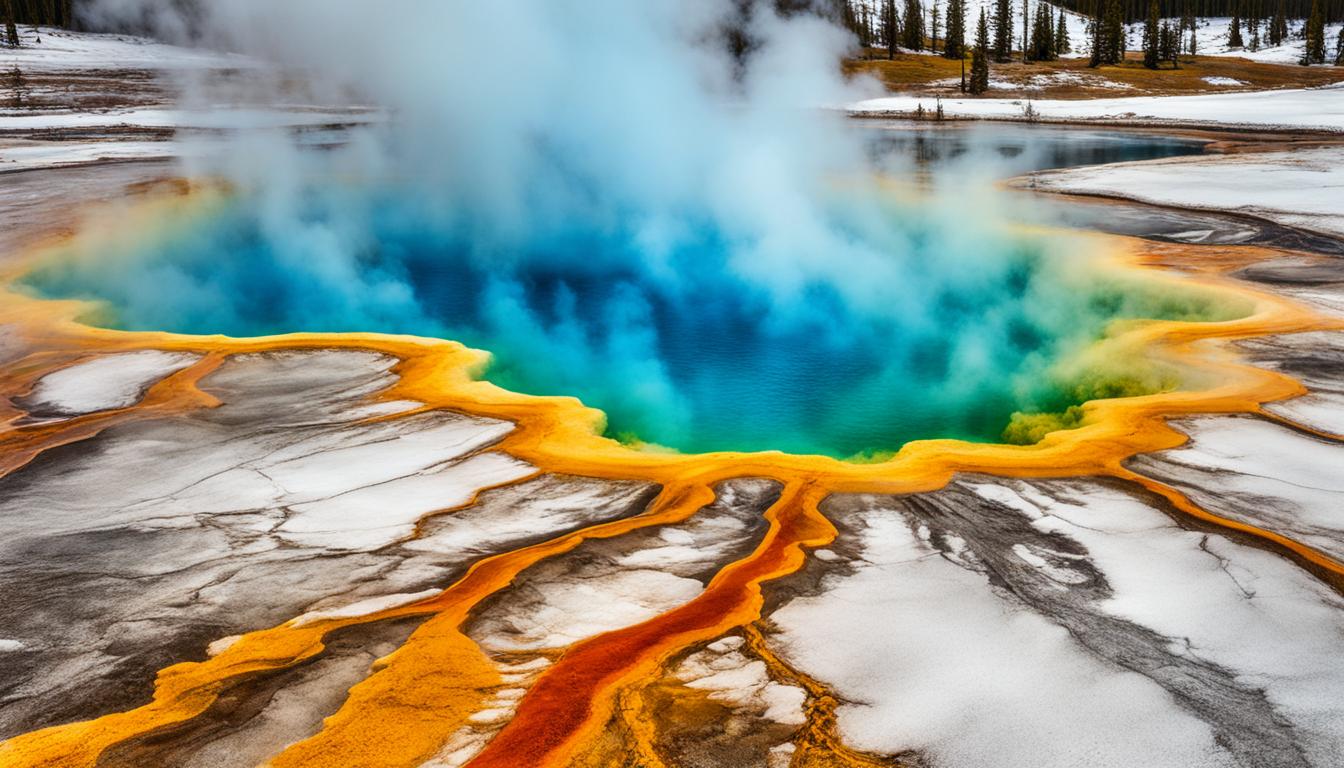Wonders of the Wild: Exploring Yellowstone National Park
Ever wondered what’s in the vast Yellowstone National Park? This American treasure covers 3,472 square miles. For over a century, it has amazed all who visit. But what secrets does this Wyoming wilderness keep, and what surprises does it have for those who explore?
Yellowstone National Park was the first of its kind in the USA, opening in 1872. It’s a showcase of the American West’s natural beauty. Sitting on the Yellowstone Caldera, a massive volcanic system, it features geysers, hot springs, and mud pots. These spots have drawn people in since 1870.
Key Takeaways
- Yellowstone National Park spans an awe-inspiring 3,472 square miles of pristine wilderness, with most of the park situated in Wyoming and areas extending into Montana and Idaho.
- The park’s unique location atop the Yellowstone Caldera, one of the largest volcanic systems in the world, sets the stage for an unparalleled showcase of geothermal activity.
- Established in 1872 as America’s first national park, Yellowstone was founded to ensure public access, enjoyment of nature, and conservation of wilderness for generations to come.
- The park’s rich history and geological marvels have captivated visitors since the Washburn Expedition of 1870, the first recorded visitors to this area that was long revered by Native American tribes.
- Yellowstone National Park offers an abundance of wildlife, including iconic species such as grizzly bears, wolves, bison, and elk, as well as an extensive network of hiking trails that allow visitors to immerse themselves in the stunning wilderness.
Discover Yellowstone’s Iconic Landmarks
A trip to Yellowstone National Park isn’t complete without seeing Old Faithful. This geyser is known for its regular blasts into the sky. It typically erupts 20 times a day, reaching heights of 100 to 185 feet.
Not far from the Old Faithful Inn, it’s been a must-see since the park opened. The surrounding area, the Upper Geyser Basin, has more geysers than any place on earth. Including Old Faithful, there are five major geysers. These are listed by the Park Rangers and at the Old Faithful Visitor Education Center.
Firehole Lake Drive
Yellowstone is filled with wonders, including most of the world’s geysers. Firehole Lake Drive offers a 3-mile loop through the Lower Geyser Basin. It includes geysers, hot springs, and beautiful hot lakes. The Great Fountain Geyser, which can spout water 200 feet high, and the White Dome Geyser, which looks like a white cone, are some of the highlights on this drive.
Fountain Paint Pot Trail
On the Fountain Paint Pot Trail, experience a range of colors and textures. It’s a short, half-mile walk through the Lower Geyser Basin. You’ll see geysers, hot springs, mud pots, and fumaroles. Don’t miss the Fountain Paint Pot, with clay colors that change all the time. You can also spot the Leather Pool and the Silex Spring, known for its icy blue waters, as you walk.
Yellowstone National Park: A Geological Marvel

Journey to Mammoth Hot Springs in Yellowstone, where you’ll find amazing terraces. These terraces look like icy waterfalls but are formed from hot springs. Created over thousands of years, the hot water leaves behind calcium carbonate when it cools.
Explore this area with its upper and lower terraces linked by a boardwalk. It has about 20 hydrothermal features, such as Angel Terrace and Liberty Cap. Also, this spot is known for its active elk during their mating season from late September to early October.
West Thumb Geyser Basin
The West Thumb Geyser Basin sits beside Yellowstone Lake. It combines unique geothermal features with stunning mountain views. You can walk a figure-eight trail around the outer boardwalk loop and inner loop. This will take you past amazing features like Seismograph Pool and Black Pool.
This area, where geothermal wonders meet water, is a magical place. It’s especially beautiful at sunrise. Here, the park’s geology shows its incredible diversity.
Embracing the Wilderness

Yellowstone National Park is known for its diverse wildlife. You’ll find grizzly bears, wolves, bison, and elk living here. Visitors can watch these animals in the wild. But remember to keep your distance and obey park rules. In the Mammoth Hot Springs area, you might see a lot of elk during their mating season. This happens in late September to early October. It’s a great chance to see these amazing animals close up.
Hiking Trails
Yellowstone National Park is full of hiking trails. These paths let you explore the beautiful wilderness. You can choose from easy boardwalk trails to more challenging hikes. The Upper Geyser Basin Trail is a favorite, open from mid-April to mid-November. The Mammoth Hot Springs Trail has several hundred steps and connects upper and lower terraces.
Conclusion
Yellowstone National Park is a true wonder of the wild. It lets visitors see unique geological marvels, famous landmarks, and lots of animals. Its geysers, hot springs, and amazing landscapes make for experiences you’ll never forget. This iconic park is great for both first-timers and those who love to explore.
The park has a rich history and is known for its unique geology and diverse life. Exploring Yellowstone, you’ll see how big and complex it is. You’ll find huge mountains, hot springs, and amazing wildlife. These show the amazing balance of life in this special place.
You might visit Yellowstone to see the geysers, explore the wild, or just enjoy nature’s beauty. No matter why you visit, you’ll leave amazed by its wonders. It’s a chance to appreciate the powerful forces that have made this park so incredible. So, pack your bags and prepare for a journey through one of America’s most stunning natural wonders.







